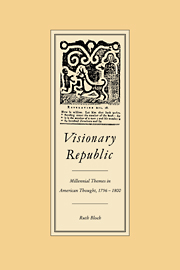Book contents
- Frontmatter
- Contents
- Acknowledgments
- Introduction
- PART I THE DEVELOPMENT OF A MILLENNIAL TRADITION IN COLONIAL AMERICA
- PART II THE RISE AND DECLINE OF MILLENNIALISM IN THE REVOLUTIONARY ERA
- PART III THE ESCHATOLOGICAL REVIVAL OF THE 1790'S
- 6 Exegesis
- 7 Francophilic millennialism and partisan Republican ideology
- 8 Biblical millennialism and radical Enlightened utopianism
- 9 Francophobic reaction and evangelical activism
- Notes
- Index
7 - Francophilic millennialism and partisan Republican ideology
Published online by Cambridge University Press: 29 October 2009
- Frontmatter
- Contents
- Acknowledgments
- Introduction
- PART I THE DEVELOPMENT OF A MILLENNIAL TRADITION IN COLONIAL AMERICA
- PART II THE RISE AND DECLINE OF MILLENNIALISM IN THE REVOLUTIONARY ERA
- PART III THE ESCHATOLOGICAL REVIVAL OF THE 1790'S
- 6 Exegesis
- 7 Francophilic millennialism and partisan Republican ideology
- 8 Biblical millennialism and radical Enlightened utopianism
- 9 Francophobic reaction and evangelical activism
- Notes
- Index
Summary
… the stone that smote the image became a great mountain, and filled the whole earth.
Daniel 2:35The nonpolitical scriptural exegesis that emerged in the late 1780's and 1790's arose in conjunction with, and partly in reaction against, a resurgence of highly political millennial expectations. In contrast to the millennial scholarship that revolved around such issues as Christ's presence during the millennium, the conversion of the Jews, and the identification of John's trumpets and vials with long-past historical events, many contemporary observers articulated a more directly political message. Even the exegetes who disparaged political action usually reserved some small place for contemporary republican revolutions in their cosmic schemes. And, whether they liked it or not, there were always political implications imbedded in their common prediction of forthcoming social perfection. Samuel Hopkins, for all his caution and supernatural-mindedness, still expected a millennium of shared property, universal benevolence, and spiritual enlightenment to begin within two hundred years. Other interpreters of prophecy, celebrating the success of the American Revolution and watching events then transpiring in France, assumed a more expectant, activistic, and partisan stance.
These two tendencies within the millennial publications of the 1790's were at once conflicting and mutually reinforcing. The exegetical writing that downplayed the immediate importance of contemporary political events nonetheless provided a more systematic and self-conscious description of the sacred, universal, and transhistorical context that gave these events their ultimate eschatological meaning. Moreover, for all their contempt for worldly preoccupations, these expositors' interest in such seemingly nonpolitical issues as the millennial presence of Christ and the conversion of the Jews often indirectly expressed social and political concerns.
- Type
- Chapter
- Information
- Visionary RepublicMillennial Themes in American Thought, 1756–1800, pp. 150 - 186Publisher: Cambridge University PressPrint publication year: 1985



